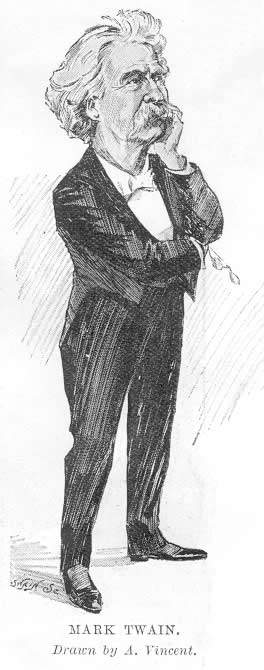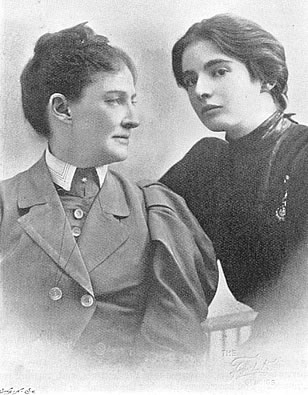
Home | Quotations | Newspaper Articles | Special Features | Links | Search

Home | Quotations |
Newspaper Articles | Special Features | Links
| Search
From: THE SKETCH, Nov. 27, 1895, page. 245.
Unfortunately, perhaps, for himself, but decidedly fortunately for the people who have the pleasure of listening to him, Mark Twain has been dragged out of his American study by pecuniary losses to the footlights of the lecture-platform and the admiring gaze of his multitudinous readers. It is quite twenty years since the author of "Huck Finn" spoke across the footlights, and even at that distant date his lectures were very few in number, so that the people who have seen or heard the humorist in public prior to his present lecturing tour must be very limited indeed. Perhaps it is a good thing that Mark Twain has been compelled to take to lecturing for a time, as it will enable him to visit countries previously unknown to him, and, as he has already promised, result in "Tramp Abroad," Vol. II., being published. In fact, Mark Twain has so arranged his tour that he will not revisit any of the countries which formed such excellent scope for witty observation in his well-known book. Mark Twain placed himself unreservedly under the care of that well-known Colonial lecture-agent, Mr. R. S. Smythe, who has negotiated so many big "stars" through the Colonies. Crossing from San Francisco, the humorist opened his tour in Sydney in the middle of September. His tour, which will last a year. extends over all the Australian Colonies, New Zealand, Mauritius, Ceylon, and South Africa. He had an offer of £2000 for ten lectures in London, but for the present had to refuse it. He will finish his Colonial tour, and get the resultant book off his hands before thinking of a trip to England.
 |
As a lecturer--or rather, storyteller, for the author objects to be called a lecturer--Mark Twain is, and has proved himself to be, in his opening Australian "At Homes," a decided success. Like Charles Dickens, he relies entirely on his old books for the pabulum of his discourses, but, unlike the author of "Pickwick," he does not read long extracts from these books. He takes some of his best stories--"The Jumping Frog," "Huck Finn," the difficulties of the German language, par exemple--and retells them, with many subtle additions of humour and some fresh observations, in the most irresistibly amusing manner. He is in no sense a disappointment as a humorist. He starts his audience laughing in the very first sentence he utters, and for two hours keeps them in a continual roar. The only serious moments occur when, with the unutterable pathos of which the true humorist alone is capable, he interpolates a few pathetic touches which almost make the tears mingle with the smiles. Every story he tells serves the purpose of illustrating a moral, and, although, for the most part, he talks in low, slow, conversational tones, at times he rises to real bursts of eloquence--not the polished, grandiloquent eloquence of the average American speaker, but the eloquence conveyed in simple words and phrases, and prompted by some deep and sincerely felt sentiment. The author has the power of seeming to jest at his serious side, just as in his books;' but there is no mistaking the seriousness with which, for example, he is moved by the remembrance of the iniquities perpetrated on liberty in the old slavery days amid which Huck Finn and Jim the slave lived. He makes the most unexpected anecdotes point the most unexpected morals, but it is the recital of the old, familiar stories without any moral attaching to them which pleases most, coming as they do warm from the brain of the man who invented them. |
Mark Twain steals
unobtrusively on to the platform, dressed in the regulation evening-clothes,
with the trouser-pockets cut high up into which he occasionally dives both hands.
He bows with quiet dignity to the roaring cheers which greet him at every "At
Home." Then with natural, unaffected gesture, and with scarcely any prelude,
he gets under weigh with his first story. He is a picturesque figure on the
stage. His long, shaggy, white hair surmounts a face full of intellectual fire.
The eyes, arched with bushy brows, and which seem to be closed most of the time
while he is speaking, flash out now and then from their deep sockets with a
genial, kindly, pathetic look, and the face is deeply drawn with the furrows
accumulated during an existence of sixty years. He talks in short sentences,
with a peculiar smack of the lips at the end of each. His language is just that
of his books, full of the quaintest Americanisms, and showing an utter disregard
for the polished diction of most lecturers. "It was not" is always
" 'twarn't " with Mark Twain, and "mighty fine" and "my
kingdom" and "they done it" and "catched," and various
other purely transatlantic words and phrases, crop up profusely during his talk.
He speaks slowly, lazily, and wearily, as of a man dropping off to sleep, rarely
raising his voice above a conversational tone; but it has that characteristic
nasal sound which penetrates to the back of the largest building. His figure
is rather slight, not above middle height, and the whole man suggests an utter
lack of physical energy. As a matter of fact, Mark Twain detests exercise, and
the attraction must be very strong to induce him to go very far out of doors.
Rolf Boldrewood called on him in Melbourne, and had the greatest difficulty
in the world to persuade him to take a drive. With the exception of an occasional
curious trot, as when recounting his buck-jumping experiences, Mark Twain stands
perfectly still in one place during the whole of the time he is talking to the
audience. He rarely moves his arms, unless it is to adjust his spectacles or
to show by action how a certain thing was done. His characteristic attitude
is to stand quite still, with the right arm across the abdomen and the left
resting on it and supporting his chin. In this way be talks on for nearly two
hours; and, while the audience is laughing uproariously, he never by any chance
relapses into a smile. To have read Mark Twain is a delight, but to have seen
and heard him is a joy not readily to be forgotten. The humorist is accompanied
on his tour by his wife and charming second daughter.
- R. C. B.

MARK TWAIN'S WIFE
AND DAUGHTER
Photo by Falk, Sydney.
Quotations | Newspaper Articles | Special Features | Links | Search